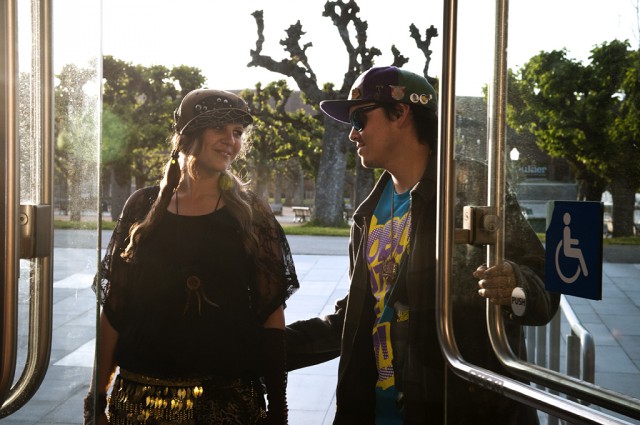
Written by Ashley Aires
A black television screen doesn’t need to wait for someone to turn it on before it can broadcast colorful images of soap operas or reports from the latest war. No, it’s already turned on – it’s always turned on. Through the screen, someone is sitting in a room filled from wall to wall with towering computer monitors, recording the smallest hint of sound or movement from the living room. But not even the slightest hiccup is safe from the cameras. The most minuscule eyebrow twitch can put you in jail. If you’re home, they’ll find you.
If you think your thoughts are safe, think again. The Thought Police can invade your mind if they think you’re against them. Nothing is safe. Nowhere is safe.
Sounds terrifying, right? It’s a good thing that this world exists only in a book that was written in 1949.
Or at least it did.
George Orwell’s 1984 imagined a world in which all members of society were controlled by a greater, all-powerful Big Brother force. If someone were to merely say the wrong thing in the privacy of their own home, Big Brother’s minions came in and swept them away forever. Citizens of Oceania couldn’t go anywhere without fear of being punished by the government for the slightest infraction, since even the mere thought of disagreeing with Big Brother could land them in prison. The real-life society that grew up reading this story believed this was a creative, albeit terrifying, fiction that could never happen to them.
Fast forward to 2012. Thanks to the war on terror, people can be picked up by the military and taken to secret prisons, never to be heard from again. The government can read our emails and listen to our phone calls, which they say is for our own protection. Our society is being forced to conform to one specific identity, and anyone who cannot fit that role is alienated from their community, just because our politicians think they know best. Sounds eerily familiar to 1984, right?
After September 11, 2001, our government took bigger –and scarier- steps to fight the “war on terror.” Soon after the attacks on the World Trade Center (and the Pentagon, which often gets ignored because it wasn’t completely destroyed), Congress passed the USA Patriot Act, which had different ways that the citizens of our beautiful country could be monitored and therefore, defended. But Act II of the law makes it almost too easy for the government to take advantage of their new powers and infringe upon citizens’ privacy rights.
The Patriot Act allows the government to tap the phone lines of people who they suspect of being tied to terrorist groups. All they have to do to be able to listen in on phone calls is to have the FBI sign on some dotted lines and have a judge review the order. What they don’t need is probable cause. Americans have the right to be protected from unreasonable searches thanks to the Fourth Amendment, but that doesn’t apply here because we’re trying to stop terrorism. Oh, and the government doesn’t have to tell you if they’re spying on you, because they fear that actual terrorists will run if they figure out that their phones are being tapped.
But the Patriot Act doesn’t just stop with domestic spying. Rebecca Jeschke, the media relations director and digital rights analysis with the Electronic Frontier Foundation, says that the Foreign Intelligence Surveillance Act was originally designed to make it easier for the US to spy on foreign countries, but now Americans are vulnerable as well.
“The FISA Amendments Act of 2008 gave immunity to telecoms who participated in illegal spying of Americans,” she explains.
But the federal government isn’t the only group trying to invade our privacy. Major companies like Google are changing their privacy policies to make it easier to collect our personal information to in turn make it “easier” for us to use their services. Google’s new privacy policy will allow the company to mine data from every Google site, including Youtube, Gmail, Google’s search engine, and Google+. The company can record what you type into their convenient search engine or the videos you watch on Youtube to tailor every advertisement to fit the user’s specific needs.
Having all of this data compiled on a couple of supercomputers can be incredibly dangerous for the user who just wants to check her e-mail or search for pictures of funny cats. David Jacobs, a consumer protection fellow with the Electronic Privacy Information Center, says that if all of your information is combined and you happen to commit a crime, it will be much harder to separate specific information to just get one relevant piece. All this data is also great for thieves, because it’s in one convenient place!
“Knowledge of an individuals’ date of birth, gender, and address allows you to predict their social security number with anywhere from 60-80 percent accuracy,” explains Jacobs. “We don’t believe that is necessarily going to do this, but the potential exists, and the risk grows as more data is aggregated, which is one reason why people object to aggregation–even if no new additional information is collected, the act of aggregation can cause additional privacy risks. In a way, the whole is more than the sum of its parts.”
Google’s new privacy policy will also allow the company to send cookies to your computer that follow your mouse beyond Google’s network. Which means they now can track what you search for at Yahoo! or the news you read on CNN. Google has said this isn’t designed to spy on you; that all they are trying to do is collect data that will help them know what ads to put onto Youtube. But where do we draw the line? The very idea that Google is trying to tailor advertisements to suit individual users’ needs suggests that Google wants to make money off its users. How do we know that our information isn’t being sold to the highest bidder?
And you better start to watch what you say on Facebook, because the FBI is now spying on social networking sites. And one of the only reasons that we know about it is because they goofed up. The FBI’s Strategic Information and Operations Center had to apply to create the software that will allow them to continuously watch over social networking sites and certain news feeds. What makes this even scarier is that the Department of Homeland Security has been doing this for much longer. Both agencies claim that all they want to do is watch out for potential terrorists, but how can they only monitor these sights for terrorist plots if there are thousands of people all over the world who use these social networking sites? Jacobs says that all of this access to personal Facebook pages or Twitter feeds could potentially lead to governmental prosecution of people who disagree with the regime’s politics, just like the Thought Police in 1984.
But perhaps the most terrifying thing about the world Orwell predicted in 1984 happens after Winston (the story’s protagonist) is caught with a book that holds Big Brother’s secrets. Without warning, he is dragged by the Thought Police to a secret prison, which he cannot leave and no one knows where Winston has gone. Every day, he is physically beaten and mentally tortured by the prison guards because he won’t rat out his lover Julia, who was also conspiring against Big Brother. Room 101 houses everyone’s worst nightmare and is where Winston ultimately bows down to Big Brother and becomes a complacent sheep in Big Brother’s world.
Something like this could never happen in 2012, right? Think again. Earlier this year, President Obama signed the National Defense Authorization Act for the Fiscal Year 2012, which has a section that makes Room 101 look more attainable than ever. As if keeping rumored terrorists locked away in Guantanamo Bay isn’t bad enough, read any part of Title X Subtitle B, Section 1021. It starts off by saying the President now has the right to use all necessary force to detain any person suspected of having ties to terrorist groups. But what’s really scary is this: if someone is detained, the military can keep the suspect “under the law of war without trial until the end of the hostilities authorized by the Authorization for Use of Military Force.” In other words, the military now has the power to detain someone without a trial until the war ends, which, judging by the way things are going overseas, could be indefinitely. The military also has the right to transfer detainees to other countries, countries that probably don’t have any problems using torture for interrogation.
In the Ministry of Truth, one of the four government buildings in Oceania, workers erase the identities of people who have been arrested or persecuted by Big Brother. These “unpersons” become completely forgotten by everyone who has ever known them, which makes their previous existence completely futile.
While our modern government may not be vaporizing citizens, people –mainly terrorist suspects – become invisible everyday. Take Bradley Manning, the man who released classified military documents to the controversial WikiLeaks, as a terrifying example. The Human Rights Watch released a report describing the conditions of Manning’s detention, including that he has been primarily kept in solitary confinement, that he isn’t allowed to wear clothing at night, and can only be removed from these conditions if he agrees to release confidential medical information. Manning was taken to a military prison in Quantico, Virginia back in July of 2010, and didn’t get a public hearing until December of 2011, which also happened to be the first time he was seen by the public since he was arrested. All of this treatment seems to suggest that the US government is trying to pretend that Manning never existed, and combined with the almost 800 prisoners who have passed through Guantanamo Bay, it certainly seems like the government is trying to create new “unpersons.”
In order for Big Brother to control the people of Oceania, they created a new language called “newspeak.” According to the book, “newspeak” was designed to erase meaning from spoken language: synonyms and antonyms were erased, leaving only the basic words like happy and sad. Negative words were turned into more positive words, like “bad” becoming “ungood.” Intense words were changed into things like “doubleplusgood” instead of “excellent.” The key goal of “newspeak” was to make it harder for people to think about what they’re saying, as well as making it harder for people to speak out against Big Brother.
While words like “goodthinkful” and “gooder” don’t exist (or even make sense) in our modern society, our language is still being manipulated to get control of our feelings. Think about the abortion debate. If you’re against abortion, you have to be pro-life, and if you agree with abortion access, you’re pro-choice. So according to the pro-lifers, people who think that women should have the right to choose to have an abortion must be anti-life. In the eyes of pro-choicer people, pro-lifers are anti-choice, but which term is worse?
According to Jeffery Schultz’s Encyclopedia of Women in American Politics, the term “pro-life” was created after the Roe v. Wade Supreme Court case made it legal for women to have an abortion. Conservatives decided to call themselves “pro-life” to emphasize their opinion that every tiny bunch of cells had the right to live.
People who think that women should be able to choose whether or not to have an abortion call themselves “pro-choice” because “pro-abortion” makes it sound like they want women to have abortions whenever they find themselves pregnant. Actually, some pro-choice people might not even agree with abortion, but they believe that no one should be able to take away a woman’s right to choice.
By calling both sides pro-something, the people who are in control of the debate are acting a lot like Big Brother and his “newspeak” language. If you’re either pro-choice or pro-life, where is the middle ground? These two extremist views don’t allow people to actually think about the abortion debate because they immediately force you to react without taking the time to consider the argument. Linguist Noam Chomsky says that polarizing the debate is intended to keep people from rebelling against their government.
“The smart way to keep people passive and obedient is to strictly limit the spectrum of acceptable opinion, but allow very lively debate within that spectrum – even encourage the more critical and dissident views,” he believes. “That gives people the sense that there’s free thinking going on, while all the time the presuppositions of the system are being reinforced by the limits put on the range of the debate.”
And if the telescreens that constantly monitor the people of Oceania sound too far fetched, think about webcams on laptops. These tiny cameras are capable of recording anything that it can see and allowing the owners of the laptop to upload videos to Youtube with a few clicks of the mouse. But is there something more sinister going on here? (Insert maniacal eyebrow raise here, cackling optional.) If someone were to remotely access your webcam, would you ever even know that you were being spied on?
School officials at the Lower Merian School District in Pennsylvania took advantage of webcams in students’ laptops to monitor their activity while they were in the privacy of their own homes. The schools took hundreds of photos of students in their bedrooms and used the photos to decide whether or not students needed to be disciplined. Once students found out the school was covertly taking pictures of them, they sued the school, but unfortunately the FBI and the US Attorney’s office couldn’t prove that the school did anything criminal.
Considering how easy it is to buy spy ware that can allow people to remotely turn on a webcam, how do we know that the government isn’t spying on us right now?
The entire point of Winston’s existence is to sit in the Ministry of Truth and rewrite or erase history. If Big Brother predicts that Oceania will win a war, but they end up losing it, it’s Winston’s job to erase that prediction and make it seem like Big Brother was right all along.
The scary truth is that people that hold the power in 2012 are trying to do the exact same thing to the US’ history. Members of the Tea Party in Tennessee are trying to erase the existence of slavery from our academic history book. See, they think that slavery makes the founding fathers that owned slaves look bad, and removing all traces of slavery from the books makes Thomas Jefferson look like a swell guy.
In Texas, conservatives have successfully pushed for changes to textbooks that make it seem like the founding father’s weren’t really interested in a separation of church and state. Instead, George Washington and Ben Franklin were actually Christians who followed God’s teachings while crafting the government. According to the New York Times, they also changed the history of World War II to make America seem less racist towards the Japanese. This new history says that Japanese-Americans weren’t the only ones forced out of their homes and in to internment camps – that Germans and Italians living in America were sent to the camps too. See, we’re paranoid about everyone wanting to hurt us, not just Hello Kitty.
And we mustn’t forget other types of censorship that could exist any day now thanks to the growing popularity of the Internet. In the US, our government is debating the Stop Online Piracy Act, which would allow the government to shut down websites that feature copyrighted content. If SOPA passes, sites like Youtube and Tumblr could be shut down because the MPAA and the RIAA claims that the site is violating a copyright. But if this act is passed, companies including Wikipedia and Reddit fear that the government will push censorship even further and shut down any website that it doesn’t like.
But SOPA is small potatoes compared to the Anti-Counterfeiting Trade Agreement, which is similar but deals with every country who signs the treaty. It also involves more than just physical piracy, anything that can be considered “intellectual” property is fair game for ACTA. But the frightening thing about ACTA is that the negotiations for what will be on the treaty and how it will be enforced is being done almost entirely in secret, so we don’t know much about it.
If ACTA is signed into law, Internet providers will be left responsible for what their customers view online and will be in charge of blocking sites that violate copyright agreements. The United Nations has said that Internet access is an essential human right, which means that SOPA and ACTA are going far beyond just keeping a music video protected from being uploaded to Youtube – it’s infringing on our right to unfettered Internet access.
And ACTA also reaches beyond the Internet: Generic medicine that is designed to be a more affordable option to expensive medication can become illegal if ACTA is passed, because one company holds the patent for the main drug and therefore all generic forms are violate that patent. How is access to affordable medication a bad thing?
In the end, Winston did get out of Room 101, but at a terrible price. He ratted out the only true friend he had in hopes of saving himself from all of the pests in Big Brother’s torture chamber. Now he’s just another sheep in the government’s flock, happy to believe that 2+2=5 and War is Peace. How much longer do we have before we do the same?






Elaine Poister • Mar 30, 2013 at 7:31 pm
My mom wants to buy my younger brothers a music making studio because they want to start a band. My older brother is trying to be a rapper and he has friends that have a studio in their house or apartments but they cant use theirs because they dont know his friends but how much does it cost to get one and where do you get them from. . . . Not necessarily a celebrity professional studio just one to make music and record..